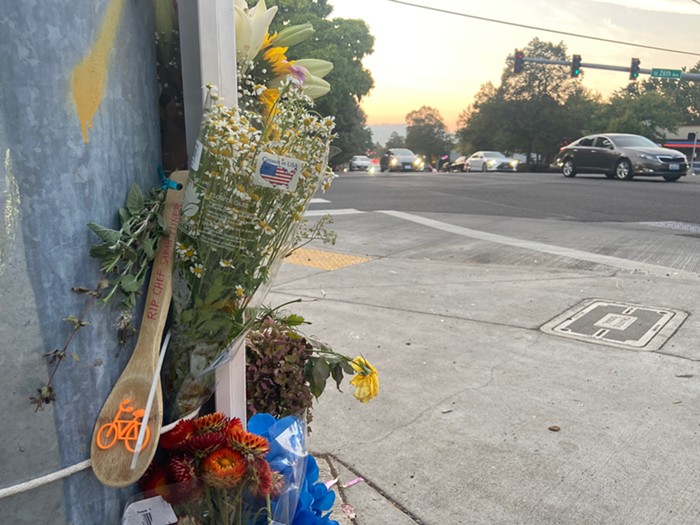
It's been 16 months since the city of Portland first fell out of compliance with the settlement agreement it made with the US Department of Justice (DOJ) regarding police use-of-force against people with a mental illness. Yet, the city is still a long way from again meeting the requirements laid out in the initial 2014 agreement, according to a report filed by DOJ attorneys Thursday.
Of the seven sections outlined in the settlement agreement, the DOJ found the city to be out of compliance with six.
The report points to continued problems with the Portland Police Bureau (PPB) adequately reporting and investigating incidents when officers use force against a member of the public—an issue that pushed the city out of compliance in 2021. In January 2020, the DOJ made the long-awaited announcement that the city had officially met all of the terms of the settlement agreement. That meant that, if the city could remain in compliance for just one more year, it could finally be released from the onerous legal agreement with the DOJ. But the heavy-handed police response to the racial justice protests of 2020 scuttled this plan. DOJ lawyers found that the PPB hadn't been following protocols to keep track of each use-of-force incident against protesters and investigate actions that went against PPB's own policy.
The latest report shows the DOJ's continued disapproval of how PPB has tracked and followed-up on officer use-of-force. In general, the report finds that PPB isn't adequately investigating and penalizing officers who use inappropriate amounts of force against members of the public.
The report points to PPB's overarching denial of problematic policing and management during the 2020 protests. It references a September 2021 bureau-wide training meant to identify issues with PPB's response to the 2020 demonstrations. Yet the only critique given by management during that training was that the protests were incorrectly classified as "one event."
Per the DOJ report: "PPB appeared largely unwilling to acknowledge in this training shortcomings with its crowd control response or lack of leadership messaging internally and externally."
This unwillingness directly impacts the mental health of PPB officers, the report finds. During a "wellness class" for officers, DOJ attorneys noted that officers expressed they had been ostracized in social settings outside of work for being a member of the PPB, based on officers' response to the 2020 protests.
During that class, the report writes, "Officers called out PPB’s managers for not 'owning poor training, policy, and direction.'"
The report also notes that PPB's officer training isn't in alignment with the type of training agreed-upon in the settlement. The attorneys specifically point to flaws in the training presentation for PPB's Rapid Response Team, which was disclosed to the public in January 2022. That presentation included an offensive meme mocking protesters and what the DOJ determines to be inaccurate information on the "legal justification of force" against protesters. The report adds that PPB did little to remedy the impact that this offensive presentation had on the public's perception of its police or internal morale, let alone hold a new training for officers with a more appropriate presentation.
"In the absence of effective remedial training, the offensive RRT slides impose an unmitigated impact on the organization as a whole," the DOJ report reads.
The report finds the city also failing to meet its responsibilities to improve interactions between police and people in a mental health crisis. DOJ attorneys point to PPB's Behavioral Health Unit (BHU) no longer receiving required guidance from the BHU Advisory Committee (BHUAC). As interactions between police and mentally ill adults appears to worsen, the DOJ has suggested the BHUAC review past cases where officers use force against people in crisis and offer recommendations on how to improve to PPB. While this suggestion came nearly 8 months ago, the DOJ report said that no progress has been made to implement this plan.
Notably, the report finds that the PPB has a "fundamental issue of accountability" regarding officer misconduct. This is reflected in the way PPB supervisors did not hold officers accountable for inappropriate uses of force during the 2020 protests, the DOJ attorneys write, instead blaming all problems on members of the public.
"We continued to see PPB members conflate the actions of the crowd generally with the individual justification required for each separate application of force," the report reads. With that in mind, the report noted that the city is no longer in compliance with a requirement to follow a discipline guide, as it is clear PPB is not offering consistent discipline to officers who go against PPB policy.
The report brings back an issue the city has previously struggled with: its inability to support a community oversight board mandated by the settlement. The board, dubbed the Portland Committee on Community-Engaged Policing (PCCEP), is overseen by city office with frequent turnover, often leaving the volunteer group unsupported and unable to meet its goals. This came to a head in March, when the mayor's office suggested putting PCCEP meetings on pause until they had enough city staff to run the meetings. The city ultimately decided against this plan.
One section of the settlement agreement isn't measured in Thursday's report, as it was only added to the agreement in April. That section tacks on a few extra requirements that DOJ and the city agreed upon after the city slipped out of compliance in 2020. The requirements—which include a body worn camera policy, a new "dean of training" for PPB, and a new community oversight structure—will be assessed by the DOJ in next year's report.
The DOJ report does point out some silver linings in the city's police accountability work, including the new amendment and the creation and tentative success of the Portland Street Response (PSR) program. DOJ attorneys will further detail their findings in a federal court hearing on July 27.
"Despite the City’s recent further backsliding," the report reads, "we have considerable cause for optimism going forward."



















